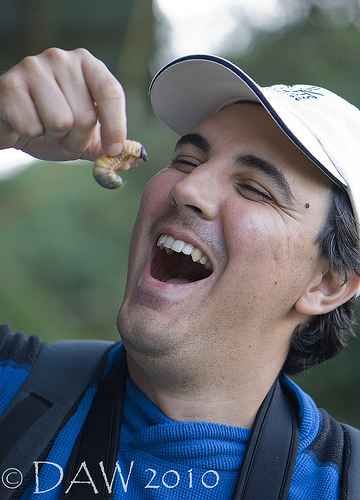Dr. Greg Schmaltz is an Associate Professor in the Department of Biology. He teaches a diversity of courses, ranging from first year biology, to second year cell biology, and to upper level courses in physiology, ecology, and ornithology.
Personal
I was born in southern France and grew up there. I spent the first twenty years of my life in France.
I did all of my K-12 education in France and I began my BSc. For my third year of study, I did a one-year exchange to the University of Quebec in Montreal (UQAM). I enjoyed it so much that I finished my BSc there. I started my MSc in Montreal but switched to Concordia University to work on foraging behaviour in birds. I did my PhD at McMaster University in Hamilton, Ontario. A nice perk was that I got to spend my winters in the Caribbean to study in the field the mating systems of a communally living cuckoo bird.
University types are not all work and no play! Between my MSc and PhD I took a year off from my studies to re-energize. I travelled to many places, some for fun like backpacking in the Rockies, and some for work such as bird related field work in Pennsylvania. There are a lot of opportunities out there for students to travel, network, and learn career related skills. I strongly encourage students to think a little outside the box!
UFV Life
My first full time faculty position was in Nevada. I worked at an institution that focused heavily on undergraduate student teaching and one-on-one hands on experiences for students. When I decided to move back to Canada, I was looking for a University with similar core values. UFV is a pretty unique place in BC that puts undergraduate students at the center of its core mission.
What I wish people knew about UFV? I wish other people had a chance to tour a lot of Universities in Canada and abroad. As a first year student, like many, I was put in an amphitheater seating 400 students for my first biology classes. Here, students get a chance to know their professors and interact with them both in the lecture and the lab. It is a huge perk for our students to get professionals teaching all courses in small class settings rather than having graduate students being in charge of a lot of the teaching in very large classrooms.
Teaching
Did I always know that I wanted to teach? Not really. I always knew I had a strong interest in science but before teaching it I needed to figure out exactly what I wanted to study. I took a diversity of courses in university to “test drive” a bunch of disciplines and subtopics to see where my interests really were and to see how I interacted with my lecturers. After a few semesters, I knew that biology was right for me and that I wanted to communicate it to others. My first teaching experiences were during my masters. I love the multidisciplinary nature of biology and how it related to who we are, to our health and the health of our loved ones, and how we relate with the natural world.
During my PhD, I was looking at the mating system of a cuckoo bird. I studied their ecology, their genetics to learn about parentage, and their physiology to relate hormone profiles to their behaviour. With this pretty broad research background, I teach a diversity of courses at UFV, ranging from first year biology, to second year cell biology, and to upper level courses in physiology, ecology, and ornithology. I enjoy teaching many courses but if I had to pick one I enjoy most I would probably pick ornithology because a lot of the learning happens outside of the traditional classroom: in the lab to learn about bird adaptations, and in the field to learn how to identify various species.
The most rewarding parts of my job is the diversity of the courses I teach. I get a chance to get to know students from their freshman year until they graduate. It is pretty amazing to get to witness the growth in student thinking in four short years.
Do I have any advice for current or prospective students? Absolutely! Follow your passion(s), don’t be afraid to talk to your professors informally to get some advice, and network as much as you can with fellow students, employers, through volunteering and so on. The road to a successful career is a winding road and you will likely take a few unexpected turns along the way. Try to enjoy the ride at least as much as the goal(s) you are pursuing.
Research
My research interests are varied and fall under three main categories. First, I am interested at the relationship between physiology (mostly hormones) and behaviour whether it is in birds or humans. I am especially interested in studying stress hormone levels (glucocorticosteroids) and how they relate to various biological variables of interest. For instance, I looked at stress hormones in eggs and how they relate to the stress experience by laying females. I also collaborated with UFV students to look at stress hormones in salivary samples of UFV students to look for variations in profiles around exam periods or other stressful events. Second, I am interested in field studies of foraging behaviour in birds. Some studies in the past were done abroad (e.g. Puerto Rico) and some at the Agriculture Canada facility in Agassiz. Finally, when time allows, I like to supervise students that come to me with their own ideas and areas of interest. For instance, a UFV student and I recently published a review paper on the overall health effects of electronic cigarette use.
(photo credit: Debbie Wheeler, UFV)
The opinions expressed in this article are the author’s own and do not necessarily reflect the views of the Faculty of Science.

